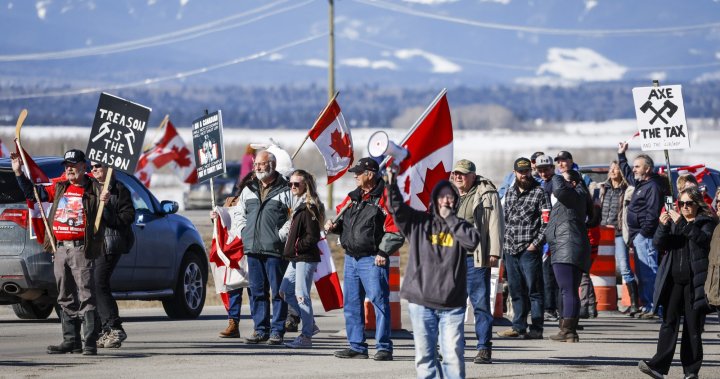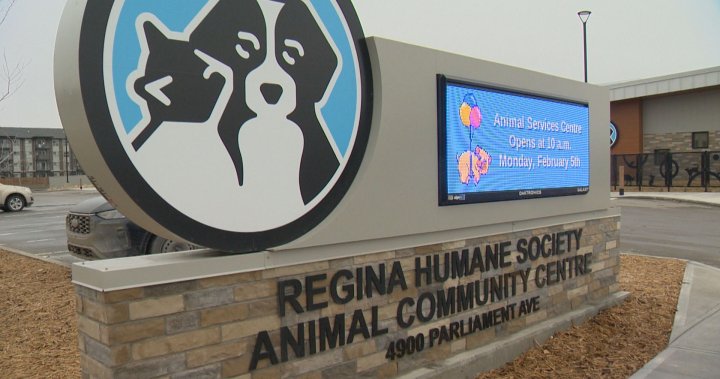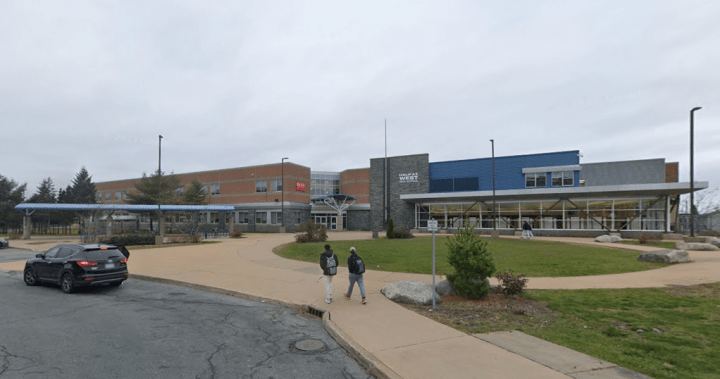Anger over the increase to the federal carbon price led to protests across the country Monday, including several that stalled traffic on the Trans-Canada Highway and at provincial border crossings.
Ottawa’s planned $15-per-tonne increase in the federal consumer carbon price came into effect Monday, bringing the levy to $80 per tonne.
That translates to the carbon price on fuel rising from about $0.14 to almost $0.18, bringing a litre of gasoline up 3.3 cents per litre on average.
Speaking outside a gas station in Nanaimo, B.C., Conservative Leader Pierre Poilievre called Monday’s increase a “cruel April Fool’s Day joke on Canadians” amid the high cost of living.
“We need to unify our country around an optimistic vision to axe the tax, build the homes, fix the budget and stop the crime,” he said when asked about the protests.
Prime Minister Justin Trudeau has said the increase also means larger quarterly rebate cheques for Canadians, which he said Monday are set to go out on April 15.
But protesters in several provinces who descended on government buildings and blocked roads Monday — many holding signs that echoed Poilievre’s “axe the tax” and “spike the hike” slogans — said the increase is contributing to their affordability woes.
“We’ve had enough,” Jeff Galbraith, a People’s Party of Canada candidate, told Global News at a rally in Hope, B.C. that grew throughout the day, with protesters later disrupting traffic on three nearby highways including the Trans-Canada.
“I think we got a lot of frustrated, disillusioned, disheartened, disenfranchised Canadians. A majority of Canadians … they feel they have no voice anymore.”
In Cochrane, Alta., hundreds of protesters blocked the Trans-Canada Highway down to a single lane. RCMP officers were on hand to monitor the event.
“Gas is coming up. Everything’s coming up. We can’t afford it,” said Nicki Langlouys, a participant in Monday’s protest. “I know people who are losing their homes.”
The event, organized by a group called Nationwide Protest Against Carbon Tax, was one of about 15 that took place across the country, including on Parliament Hill.
The email you need for the day’s
top news stories from Canada and around the world.
Protesters also temporarily blocked part of the Trans-Canada Highway linking Nova Scotia and New Brunswick, Manitoba and Saskatchewan, Saskatchewan and Alberta, and Alberta and British Columbia.
Samuel Field, a mechanic from Nova Scotia’s Annapolis Valley who owns a repair shop and a convenience store attended the protest in Aulac, N.B. He said his customers are already feeling the pinch from the rising cost of living.
“It’s important for me to stand up for them, because I’m there to provide for them,” he said. “I want us all to succeed. It’s not good what’s going on. Our industries are being destroyed, our communities are being destroyed, it’s hurting our families.”
Field, who served as a spokesperson for the protest group, said Monday morning that demonstrators intended to stay there until federal carbon pricing is done away with.
However, the RCMP in Nova Scotia and New Brunswick announced Monday afternoon that traffic was flowing again.
Field said the protest was not intended to block the border, and described it as a “traffic slow” to raise awareness for the issue.
By around noon Monday, dozens of people were gathered on Parliament Hill, some waving “axe the tax” signs, while others draped themselves in Canadian flags or expletive-laced messages about the prime minister.
Some premiers have called on the federal government to cancel the hike because of the affordability crisis, including Alberta Premier Danielle Smith.
Alberta was hit with another hike Monday as the provincial government fully reinstated its fuel tax, meaning an increase of four cents per litre. The 13-cents-per-litre tax was suspended for all of 2023 and partially reinstated in January 2024.
Smith joined other provincial leaders, including Saskatchewan Premier Scott Moe and New Brunswick Premier Blaine Higgs, in testifying before a parliamentary committee last week about their opposition to the increase. Other premiers have written to Trudeau directly urging him to reverse course.
Over the weekend, Newfoundland and Labrador Premier Andrew Furey called on Trudeau to hold an “emergency meeting of leaders from across the country” to talk about potential alternatives to the federal carbon price.
Trudeau told reporters Monday that provinces have always had the ability to come up with their own alternative plans that include the minimum carbon price, and that many premiers were choosing instead to simply “complain about it and make political hay out of this.”
Poilievre has made the carbon price and Monday’s scheduled increase a key issue, hosting “axe the tax” rallies across the country. He was set to hold another one in Nanaimo later Monday evening.
— With files from Global’s Amy Judd, Alex Cooke, Paula Tran, David Baxter and the Canadian Press
© 2024 Global News, a division of Corus Entertainment Inc.




